Unraveling the Impact of Economic Crises on Socialist Societies
Economic crises are significant events that disrupt the financial equilibrium of nations, leading to widespread repercussions. In the context of socialist societies, these crises can have unique implications due to the structure of their economies and governance. Understanding the population impact, social stability, and the effectiveness of economic policies during such periods is crucial for assessing the resilience of these societies.
The Nature of Economic Crises
An economic crisis can manifest in various forms, such as a recession, hyperinflation, or a financial collapse. Each type of crisis has distinct causes and effects, but they generally lead to:
- Unemployment spikes
- Reduction in public spending
- Increased poverty levels
- Social unrest
In socialist societies, where the government often plays a dominant role in the economy, these crises can lead to a re-evaluation of economic policies and public welfare programs.
Historical Examples of Economic Crises in Socialist Societies
Several historical instances illustrate how economic crises have impacted socialist societies:
- The Soviet Union (1991): The dissolution of the Soviet Union was preceded by severe economic decline, marked by food shortages and inflation. The transition to a market economy led to significant social unrest.
- Cuba (1990s): After the collapse of the Soviet Union, Cuba faced a severe economic crisis known as the “Special Period.” The government implemented austerity measures, which affected public welfare and social stability.
- Venezuela (2010s): Venezuela’s economic crisis is characterized by hyperinflation and a collapse of public services. The state’s heavy reliance on oil revenue and subsequent mismanagement exacerbated the situation.
The Population Impact of Economic Crises
The impact of economic crises on the population in socialist societies is profound. Key effects include:
- Increased Poverty: Economic downturns lead to higher unemployment rates, pushing more citizens into poverty.
- Health Care Declines: Budget cuts can lead to deteriorating health services, affecting overall public health.
- Education Access: Funding cuts can also impact educational programs, limiting access for future generations.
These factors can lead to significant challenges in maintaining social stability and public trust in the government.
Social Stability and Economic Policies
In socialist societies, the government typically implements policies aimed at maintaining social stability during economic crises. However, the effectiveness of these policies can vary.
Key Economic Policies During Crises
- State Intervention: Governments often increase their involvement in the economy, such as nationalizing failing industries.
- Subsidies and Support: Direct support to affected populations through subsidies for food and housing can help mitigate the worst impacts.
- Public Works Programs: These initiatives can create jobs and stimulate economic activity.
While such measures can provide temporary relief, they may also lead to long-term dependency on state support, which can hinder economic recovery.
Societal Resilience in the Face of Economic Crises
Despite the challenges posed by economic crises, socialist societies have exhibited remarkable resilience. This resilience is often rooted in:
- Community Support: Social networks and community organizations often play a critical role in providing support during tough times.
- Strong Ideological Foundations: The belief in collective responsibility can foster solidarity among citizens.
- Adaptive Governance: Some governments have successfully adapted their policies to better address the needs of their populations during crises.
These factors can contribute to a society’s ability to rebound from economic turmoil.
Economic Recovery Strategies
Recovery from an economic crisis in socialist societies requires a multi-faceted approach:
- Policy Reforms: Implementing reforms that promote efficiency and innovation can help revitalize the economy.
- Investment in Infrastructure: Building and improving infrastructure can stimulate job creation and economic growth.
- International Cooperation: Engaging with other countries for trade and investment can provide necessary resources and markets.
It is essential for governments to balance their traditional roles with the need for economic recovery to ensure long-term stability.
Challenges to Recovery in Socialist Societies
While recovery is possible, several challenges can impede progress:
- Bureaucratic Inefficiencies: Heavy bureaucracy can slow down decision-making and implementation of policies.
- Resistance to Change: Populations accustomed to state control may resist necessary economic reforms.
- Global Economic Factors: External economic pressures, such as global recessions, can further complicate recovery efforts.
Addressing these challenges is crucial for fostering a robust recovery.
Conclusion
The impact of economic crises on socialist societies reveals the intricate interplay between economic policies, public welfare, and societal resilience. Historical examples demonstrate that while economic downturns can severely affect populations, the strategies employed to mitigate these impacts can vary widely.
As these societies navigate the complexities of recovery, it is vital to consider both the lessons of the past and the unique challenges they face. By fostering resilience and adapting policies to meet the evolving needs of their citizens, socialist societies can emerge stronger from crises, ultimately securing social stability and improving the welfare of their populations.
For further insights into economic strategies and their implications, check out this comprehensive guide.
For more on historical economic crises, visit this resource.
This article is in the category Society and created by AncientSocieties Team
